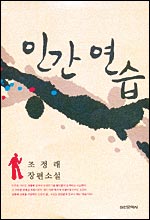the new Jo Jung-rae novel, and "defensive nationalism"
As long as Jo doesn't try to compare the Jewish holocaust and the Japanese colonial era in Korea or tout the "national question" too much he can be an insightful novelist, and I enjoyed reading especially the 10-volume Han'gang (Han River) for its depictions of ordinary as well as extraordinary people's lives in the 1960s and 1970s' Korea. So, let's pay attention to Jo's remarks about nationalism in the interview. He defends the kind of nationalism that he sees is going to be necessary for the unification from the critique of nationalism he sees emanating from "the big powers" and from those who've studied abroad and brought those theories back home. He calls that "defensive nationalism" (pangôjôk minjokchuûi). It's all fine, and Koreans are damn sure going to need some kind of good ideological mental power to cope with the unification however it's going to happen. But as long as he does not comment (and condemn, I'd say) the kind of race-centered and racist nationalism that DPRK has been spewing out from time to time and pronounce a clear distance from it, the nationalism of Jo Jung-rae that he maintains will be necessary for unification will remain hollow and at worst harmful. What keeps Jo from saying practically anything about the forms and expressions of the ideology that he so defends? His own ideology, which seems to be some Marxism mixed with relentless nationalism, not being able to give up the idea that despite of dictatorship, DPRK still has ideological contribution to make for the unified Korea? At least he doesn't seem to harbor any illusions of the present living conditions in DPRK since the early 1990s: Jo tells that his younger friend's father was the model for the novel character Pak Tong-gôn, who dies because of learning about conditions in North Korea. And the magazine journalist who tells Pak Tong-gôn the truth about the North is modelled on Jo himself. Categories at del.icio.us/hunjang: literature/movies ∙ minjok ∙ DPRK ∙ people |




Comments to note "the new Jo Jung-rae novel, and "defensive nationalism"" (Comments to posts older than 14 days are moderated)
Write a Comment